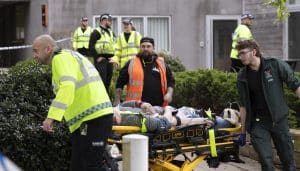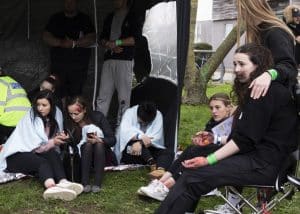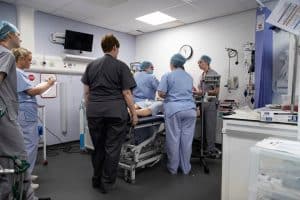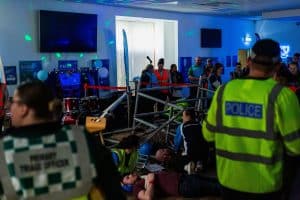


Hundreds of University of Gloucestershire students from a wide range of professions gained specialist skills and experience to enhance their learning and development at a unique major emergency simulation.
‘Operation Rockfall’ was designed by the university’s skills and simulation team to be as realistic as possible, with students performing a number of critical roles within a stressful environment following the ‘collapse’ of a stage at music gig at the University’s Oxstalls Campus that resulted in a large number of casualties.

Students worked alongside members of the emergency services, including South Western Ambulance Service, St John Ambulance, the critical care team from Great Western Air Ambulance, local NHS Hospital teams and Gloucestershire Police, while the ‘injured’ included University staff, students, graduates, and actors with additional needs from Inclusion Gloucestershire.
The University’s Oxstalls Teaching Centre was temporarily turned into the Oxstalls University Hospital featuring an emergency department, resus bay, a minor injuries unit, X-ray and imaging facility, assessment ward and an operating theatre.

The simulated activity provided students from a range of programmes, including Paramedic Science, Nursing, Student Nursing Associates, Operating Department Practitioners, Diagnostic Radiography, Physiotherapy, Healthcare Science, Professional Policing, Journalism, Media Communications, Sports Science, Business, along with medical students from Bristol Medical School, with opportunities to build upon the knowledge they had gained from their respective courses.
The simulation included a journalism and crisis communications element where students from BA (Hons) Journalism, BA (Hons) Communications and Media, and MBA Global Administration gathered information and produced simulated mainstream and social media content, considered business crisis communications management, and learned about reporting on an unfolding incident.

Simon Kersey, Practice Skills and Simulation Lead within the University’s School of Health and Social Care, said: “Operation Rockfall is unique in terms of UK university-based simulation because not only is it supported by our NHS and emergency service practice partners, it involves colleagues and students from the School of Health and Social Care and across the wider university to make it a truly multi-professional collaboration.
“It’s a wonderful opportunity for the students to practice their skills in an inter-professional system, notably modern healthcare and modern emergency response, and learn and work together with simulated casualties in a stressful but safe environment.
“The exercise is principally focused on inter-professional communication, and for students to remain professional, calm and effective in the role despite whatever stress they might come up against.
“The idea is to give them ‘stress inoculation’, to help them cope with stress, so when they go into the stresses of the real world, the modern emergency environment, they’re better able to deal with the challenges and to care for their patients effectively.”
Ends
For more information, please contact the University press office on 01242 714516 or pressoffice@glos.ac.uk
University of Gloucestershire: www.glos.ac.uk




